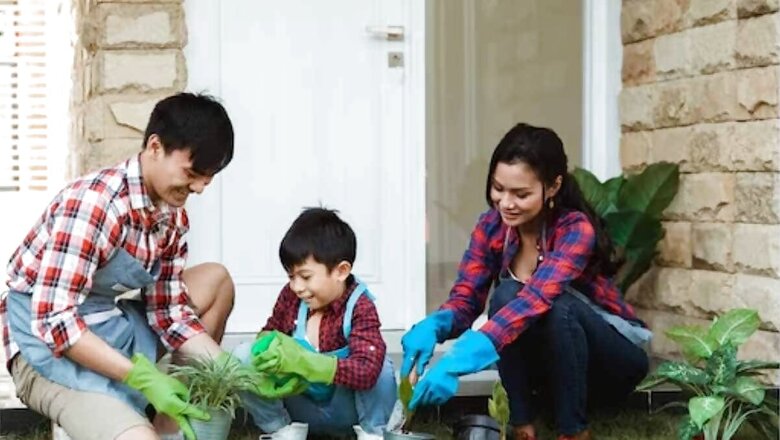
views
I think parenting is an art as well as a science. Parenting is like gardening. Parenting and gardening are similar in a lot of ways. Both experiences are a wild ride, full of ups and downs. A gardener seeds the plant, nourishes it and provides a protected space to grow. He provides an ecosystem in which plant grows. We, as parents, see ourselves in our children. Sometimes, we expect our children to behave like adults.
Childhood is a very interesting and memorable phase of the life of a child and as parents, we should rejoice in the childhood of our child. We should make parenting a joyful process. The following are my 10 golden rules of parenting.
Children learn by observing
Children are the world’s best “copycats.” They copy and imitate their parents more than anyone else. It reminds you how important it is to think carefully about what you say and do in front of your children. Your home is your child’s first classroom. Remember that your children are watching and copying everything you do. Choose your words and actions wisely. Children will follow your example more than your advice. Set a positive example for your children. So, parenting is also being a role model for your child.
Nature versus Nurture
There is an everlasting debate about whether our children are the product of their nature (genes) or their nurture (grooming). As per one school of thought, it is nature i.e. our genetics that determines our behaviour. Our abilities and personality traits are the product of our ‘nature’. Another school of thought suggests that our environment, upbringing and social influences determine our behaviour. We are nurtured to behave in a certain way. Some research suggests that genes determine personality traits. Children are naturally predisposed to certain qualities. There is no doubt that genes play a role in whether your child is bubbly, highly frustrated, or calm. But, the influence of parents is also much deeper in making what the child becomes. So, we must groom and parent them with the aim to bring out their best version.
Parenting is Imbibing Value
There is no doubt that the child should be taught manners, etiquette and civility but our core focus of parenting should be on imbibing values. If a child has all the manners and good behaviour in life but does not possess good values like honesty, compassion, kindness, love and respect for parents, he is lacking something very important in life. To quote Swami Vivekananda, it is not the tailor who makes a gentleman, but it is the character that makes a gentleman. Character is nothing but the sum total of values a child has. It is said that our thought leads to action, our action leads to our habits, our habits lead to our character and our character decides our destiny.
Yes Parenting
As parents, we are put in the position of saying “no” to our children quite frequently. Can I hang out with friends? No. Can I do my homework after I play? No. Saying ‘no’ is meant to set boundaries and limits. But, eventually, our default response for everything they ask is ‘no’. This pestering of ‘no’ upsets the child. This results in the child’s brain to filter-out ‘no’ as noise. Say ‘yes’ more than no. It strengthens the parent-child relationship and develops confidence in the child. You are not going to lose anything by saying ‘yes’. Try the exercise of saying ‘yes’ for a week or so. You will be surprised to see the positive results of saying yes.
Explore Their Creativity
If someone asks me what is the core purpose of parenting? I would say discovering the uniqueness of your child and nourishing it. Every child is different and unique. We try to make our children the best and not unique. To be best means to be better than others in a particular field, be it schooling, sports or any other area.
To be unique means you are in your own zone. To be unique is a class in itself. When the child is in his zone, he is enjoying his own inherent creativity and potential. We have always to bear in mind that each child has different potential, uniqueness and personality traits. You cannot grow mangoes on a banana tree! The aim of parenting should not be to shape or mould the child.
Channelise their energy
Children are full of energy and enthusiasm. They are bubbling with passion, activity and playfulness. If you do not harness and tap their energy be it physical, mental or emotional, this energy will lead to negativity, frustration and anger. Expose them to as many activities as possible during their childhood and teenage. It will help them find their true purpose and passion in life. Let them exhaust their energy in the process of their growth.
We all are Children
As per the dictionary, a child is a young boy or a girl who is not yet an adult. There is a child inside each one of us, who comes out in front of the person we are most comfortable with. So, parenting has to be joyful, interactive and full of playfulness.
Keep your fights in the bedroom
In a family, there are arguments, ego clashes and fights. But parents should make it a point to keep their clashes and conflicts and talk about them in their bedroom only. Children emulate their parents. If parents do not respect each other, the chances of children picking up this trait are very high. Research suggests that children are influenced deeply by fights, broken relationships, and failed marriages of parents. Parent responses to fights set the limits for the level of fights made by the children in future.
Learn from Your Children
Raise yourself before you raise your child. If the parents have good habits only then the child can have good habits. Many a time parents try to preach to their children without themselves practising it. As parents, we must grow up with our children instead of only growing old. In this process of growing together, we can also develop our own habits and can learn from our children. Never assume that they have nothing to offer to us for learning. Children enjoy life much more intensely than we do. They have excitement, fun, happiness in small things, curiosity and free from the worry of what others think about them. Sometimes it feels that we spend our entire lives trying to return to who we were as children.
Admit when you are at fault
Parents are the role-models for their children. If you make a mistake, go up to your child and admit you are wrong and say sorry. This will set an example for them to follow in life. Also, they will open up with you without any fear and develop more trust in you. If a child asks you any question and you do not know the answer, it is better to admit that you do not know the answer. Do not try to play bluff. Our children have much more avenues of accessing knowledge than we used to have.
The purpose of parenting is to make the child his best version.
Rohit Mehra is an IRS officer. He is an eminent author who has written 3 books. He has written the best-selling book on parenting: Super-Child- 52 habits of Parenting. Views expressed are personal.

















Comments
0 comment